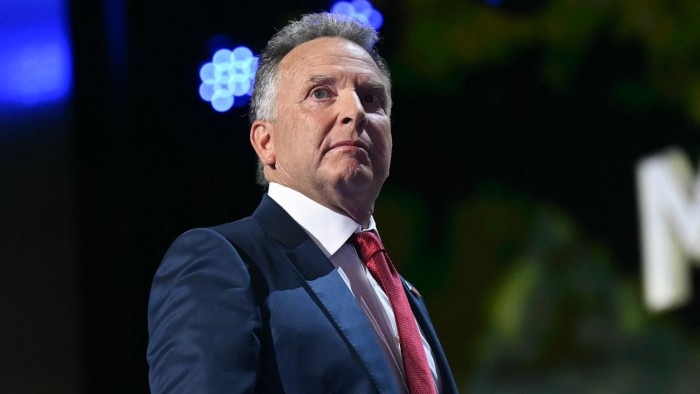Donald Trump is to put his Middle East envoy Steve Witkoff in charge of addressing Washington’s concerns over Iran, suggesting the US president is willing to test diplomacy before ramping up pressure on Tehran, people familiar with the matter said.
Witkoff, a real estate investor who played a pivotal role in securing the Gaza ceasefire, is expected to spearhead efforts on Iran’s nuclear programme as part of a broader Trump remit to “stop the wars” in the region, the people said.
Trump in 2018 pulled the US out of Iran’s nuclear accord with world powers, then imposed stringent sanctions and warned that it would be “the official end of Iran” if it fought Washington and pursued nuclear weapons.
During the transition Trump’s team drew up possible measures to reinstate his “maximum pressure” campaign on Iran, through fresh sanctions or stricter policing of current measures.
But Trump and his aides have telegraphed in early meetings that they want to keep open a path to avoiding a broader confrontation with Iran. Some Trump officials have told foreign diplomats and colleagues that they expect Witkoff to lead efforts to see whether a diplomatic accommodation is possible.
“I don’t see the administration using force at the beginning of their term before at least trying to exhaust other means. This does not fit with the approach that war started with Biden, and he’s going to end them,” a former Israeli official said.
Witkoff’s principal focus will remain the implementation of the Gaza ceasefire. Trump has also tapped Morgan Ortagus, a State Department spokesperson in his first term with experience serving in the Middle East, to be Witkoff’s deputy.
US officials say the full outlines of Trump’s approach to Tehran, and Witkoff’s remit, remain in flux. But some of the US president’s recent appointments have established a camp in the administration that would consider negotiating with Iran and is sceptical of a strike on its nuclear programme, which Iran hawks in both the US and Israeli governments have advocated.
Michael DiMino, Trump’s new top Middle East official at the Pentagon, was a former CIA official who advocated restraint in dealing with Tehran at a Koch-funded think-tank. Elbridge Colby, Trump’s nominee for under-secretary of defence for policy, has cautioned against any military action against Iran.
Others in Trump’s foreign policy team have taken a more hawkish approach, including national security adviser Mike Waltz and secretary of state Marco Rubio. During his confirmation hearing Rubio said he supported “any arrangement that allows us to have safety and stability in the region but one in which we’re clear-eyed”.
Asked about Witkoff’s role, and the administration’s approach, to Iran, Trump NSC spokesman Brian Hughes said: “We have no announcements to share at this time.”
Western officials believe Iran is at its weakest point in decades after Israel’s multifront war in the Middle East left Hamas and Hizbollah significantly diminished. Israel and the US claim a retaliatory attack on Iran last year took out much of its air defences — although this has been denied by Tehran.
The Islamic republic has also signalled it is open to talks, though analysts say it will be a significant challenge for Trump and Iran to agree to terms that would make a deal possible. The UN warned in December that Iran had taken steps to “dramatically” increase its stockpile of uranium enriched close to weapons grade.
Trump in 2018 withdrew the US from a nuclear deal between six world powers and Iran. Britain, France and Germany are keen to reach a co-ordinated approach with the US on what to do when that deal effectively expires in October, according to diplomats.
Iran’s vice-president for strategic affairs Mohammad Javad Zarif said in Davos this week that he hoped Trump would be “more serious, more focused, more realistic” in his dealings with Iran.
He said the US exit from the Iran deal had failed to “dissuade” Iran, but acknowledged the heavy economic costs on Iranian people and government. Asked whether Iran would consider a deal that required Iran to stop supporting regional proxy groups, he said: “We never had proxies.”
Witkoff’s potential stewardship of Iran issues has alarmed some Iran hawks in Congress and elsewhere in Washington, who worry he will be too quick to drop pressure on Iran in seeking a possible deal.
“He’s already lifting pressure on Hamas, Hizbollah and Iran, and in the process abandoning American hostages and endangering Israel,” said a senior Republican Congressional staffer. “He keeps saying he knows what Trump wants, but he doesn’t understand what Trump believes.”
Read the full article here




